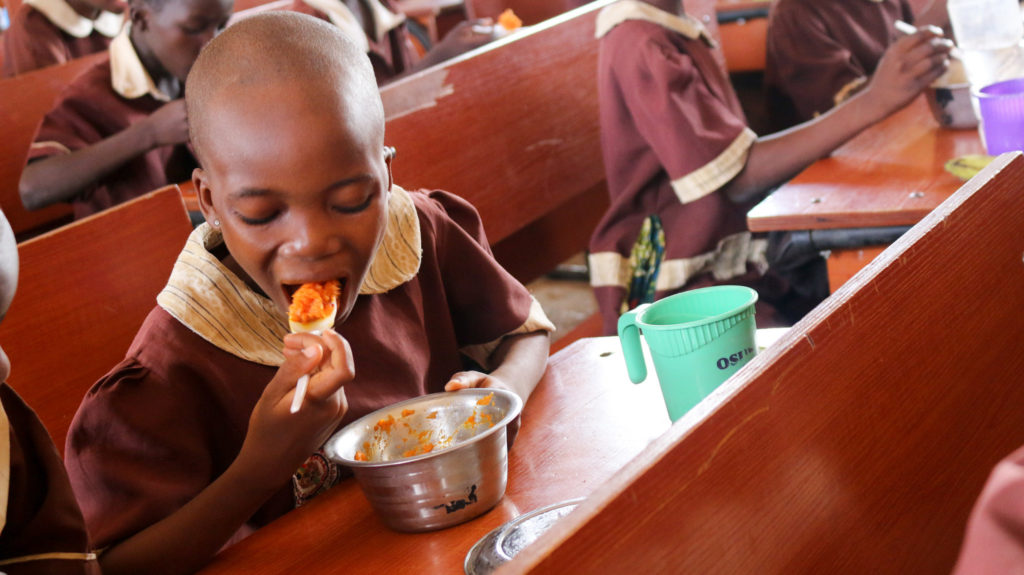Donor: Agriculture for Nutrition and Health (A4NH), The Bill and Melinda Gates Foundation,
CGIAR’s Research Program on Roots, Tubers and Bananas (RTB)
Country/Region: Nigeria/Sub-Saharan Africa
How a Song Helped Children Adapt to OFSP Meals
Orange-fleshed sweetpotato (OFSP) can be a remarkably important lifeline for many under five children in communities affected by high incidence of vitamin A deficiency (VAD). Such is the situation in the Osun State, Nigeria where 53% of children are malnourished and a similar proportion suffers from severe stunting (Esimai et al. 2001). National statistics indicate that wasting and underweight increased from 2003 to 2013, with 37% of the population stunted (National Population Commission 2014). The situation is therefore more dire in the Osun State.
To combat malnutrition and hunger, and boost student academic performance, the federal government of Nigeria introduced school feeding in elementary schools in 2004. The Osun State redesigned the program in 2012 and renamed it the Osun Elementary School Health Program (O-MEALS). It serves one mid-morning lunch to over one-quarter million students in grades one through four. CIP’s Jumpstarting Orange-fleshed Sweetpotato Project, the Partnership for Child Development and the Osun State piloted the incorporation of OFSP into the O-MEALS school lunch program. It was expected that school children would readily accept OFSP due to its attractive deep orange color. Contrary to expectations, children showed apathy towards the OFSP-based school lunch meal, with some tossing it out of the window.
Listen to the OFSP-song/rhyme
Credit: Mrs. Olubunmi Olutoyin Ayoola and Norman Kwikiriza


CIP scientists, Julius Okello and Souleimane Adekambi, in collaboration with researchers from the Swedish University of Agricultural Sciences and Cornell University, designed a two part experiment to test strategies for endearing OFSP to children, not just momentarily but for sustained periods (“for life”). The first experiment involved the use of behavioral “nudges”. The nudges were: an OFSP-song, a world-renown soccer player (inspirational character) and an age-appropriate communication, all of which associated OFSP consumption with good health and high academic performance. The study was conducted as a field experiment. About 1,000 students recruited from grades three and four in 20 schools were randomly assigned to treatments comprising the three nudges and a control, and their consumption of OFSP observed twice a week over four weeks. Reduction in plate waste (leftovers) estimated children’s acceptance of OFSP.
Results of the first experiment were as interesting as they were exciting. The nudges caused an immediate spike in OFSP consumption, and did so over the duration of the experiment. Comparative statistical tests found differences in the effectiveness of the OFSP-song, motivational character and age-appropriate communication in promoting OFSP consumption. The OFSP-song had the strongest effect, reducing plate waste from 31% (control) to 18% (treated). The results were even stronger (plate waste averaging only 12%) when school and socioeconomic effects were controlled for. Similarly, the motivational character reduced plate waste to 17%, but weaker (plate waste averaging 13%) after controlling for school and socioeconomic effects.
The second component of the experiment examined the effect of the type of promotional information on OFSP consumption among 556 third and fourth grade children randomly drawn from 10 schools. It also yielded very interesting results. Students exposed to promotional messages that focus on instrumental benefits (health, nutritional value) of OFSP ate more OFSP initially but less later. This shows that such messages are ineffective. The opposite effect was observed among children exposed to promotional messages that focused on experiential benefits (taste, appearance) of OFSP consumption. Such children consumed more of OFSP for a prolonged period of time, that is, they adhered to healthy food choices.

